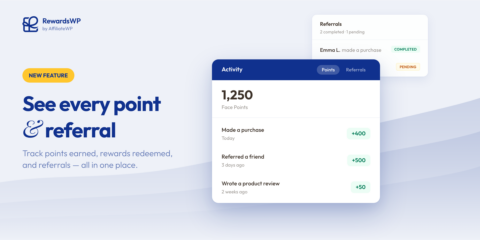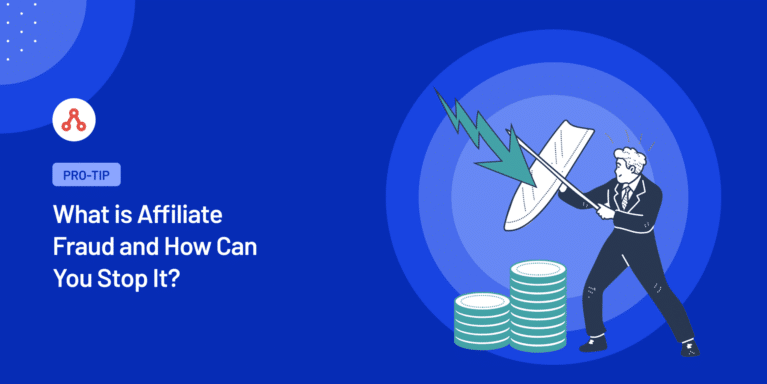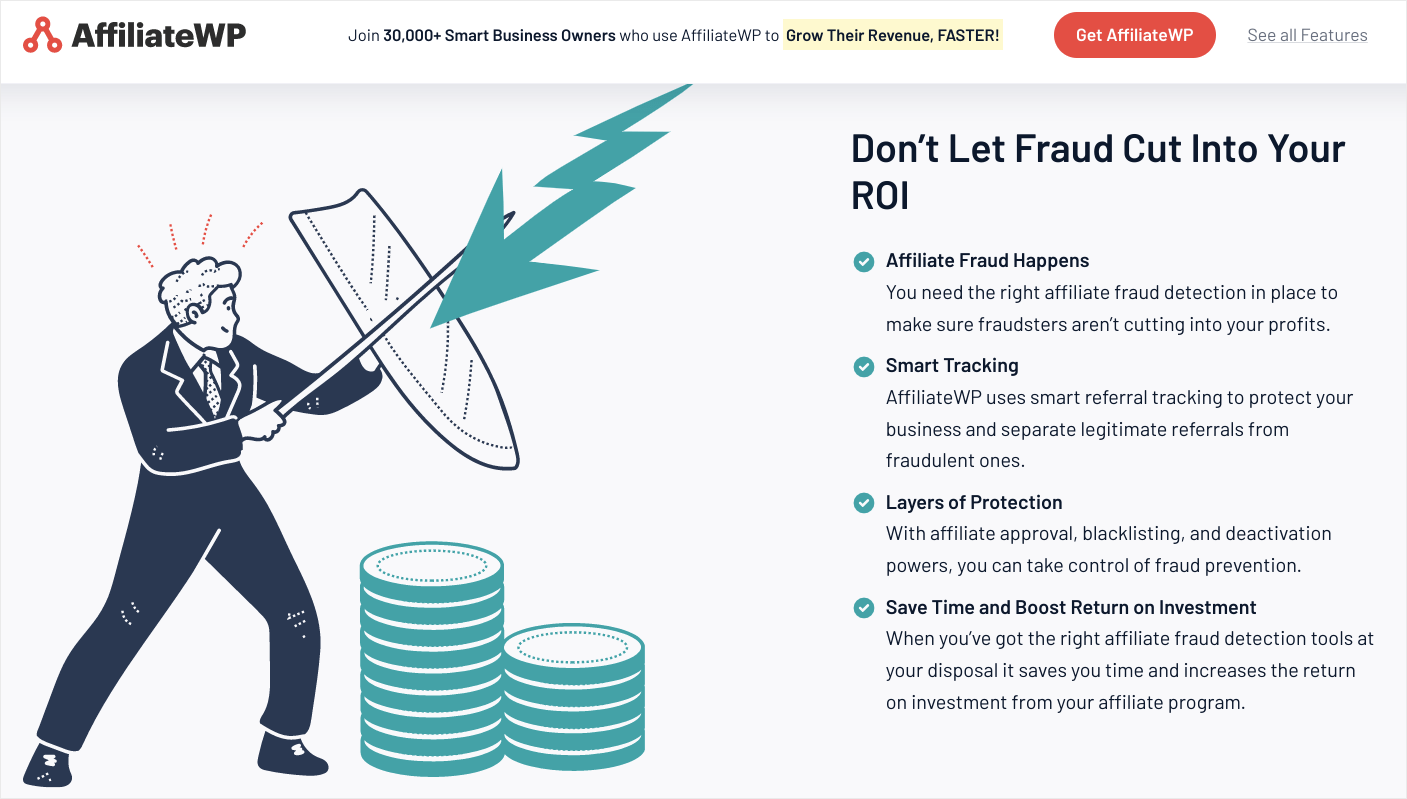
Your Customers Have Points. Now They Have Proof.
Rewards Activity gives your customers a full points history and real-time referral tracking, right inside the rewards widget. Available on all RewardsWP plans.
Continue Reading →
Rewards Activity gives your customers a full points history and real-time referral tracking, right inside the rewards widget. Available on all RewardsWP plans.
Continue Reading →
Are you worried about how affiliate fraud might impact your affiliate program?
It’s a legitimate worry, so we’ll tell you everything you need to know.
Here’s our expert guide to affiliate fraud.
Affiliate fraud is a corrupt marketing activity that can result in an affiliate fraudulently collecting commission. This can be any activity explicitly forbidden by your affiliate terms and conditions, and unfortunately, it costs affiliate programs and retailers millions of dollars.
In many ways, affiliate fraud mirrors most of the trends in advertising fraud and online security.

If you believe you’re too small to be affected or that it only happens to others, then you make yourself an easy target.
Instead, you want to be proactive, investing in the right affiliate software, and making sure you use the tools available. Top affiliate software will provide smart fraud detection, but you’ve got to make sure you’re taking advantage of it.
If not, you might find your affiliate program vulnerable to some of the techniques we’re going to discuss.
Common types of affiliate fraud include duplicating content, typosquatting, bidding on branded keywords, using stolen data, and cookie stuffing.
It isn’t straightforward to commit affiliate fraud successfully because payment is generally based on conversions (sales or leads).
Compare this to click fraud (which is more click-based, resulting in fake clicks from click farms and bots engaging in fraudulent activity on an industrial scale).
You can see that affiliate marketing is generally pretty secure. However, there are always people working to find new ways to earn money illegally, and there will always be people attempting to commit affiliate fraud.
So, what types of affiliate fraud do you need to be aware of?
This is one of the easiest ways for untrustworthy affiliates to commit affiliate fraud.
All they have to do is copy content from your legitimate affiliate’s site, put it on their site, and insert their affiliate links. The fraudster gets a good copy for free and can use it to push customers toward your offers.
Typosquatting, also known as URL hijacking, is where an affiliate uses a similar version of your URL to grab traffic from people who type your website incorrectly.
For example, an affiliate might buy up affiliateqp.com and try to pass the site off as affiliatewp.com.

You’ll always see this explicitly prohibited in affiliate terms and conditions.
This is another aspect central to an affiliate’s terms and conditions.
Affiliates can easily bid on your branded PPC keywords if they want.
They’re capitalizing on the brand power you’ve built up and pushing up your CPC by making your keywords more expensive to bid on.
Naturally, affiliate marketing programs prohibit this, but not every affiliate will abide by the rules.
This is where affiliate fraud starts to turn even more criminal.

Fraudulent affiliates can purchase stolen credit card information to create referrals on your site. They don’t necessarily want to buy the product. They want the affiliate commission, making it difficult to trace the money back to them.
Unfortunately, this scam can result in a chargeback from the credit card company, leaving you out of pocket.
Cookie stuffing is where a scammer adds cookies (what we use to track affiliate attribution) to their visitor’s browser (often through dodgy pop-ups) without the user’s knowledge.
The affiliate hasn’t done any work to promote your products, but if the user buys a product on your site (through your hard work), then the affiliate will receive a payout.
It’s estimated that affiliate fraud costs businesses over $1 billion a year.
That’s a lot of money, but a drop in the ocean compared to a total annual bill of over $120 billion for ad fraud.
When you dig into the affiliate marketing statistics, it puts things in perspective.
Affiliate marketing is the top acquisition channel for 40% of US merchants and many more around the world when you think that the current US e-commerce market is worth around $800 billion, that paints the affiliate marketing industry in a favorable light.
That’s not to say affiliate fraud isn’t a problem, but it is annoying.
Most importantly, you take affiliate fraud seriously and ensure your software protects you.
We’ve covered this subject in great detail in our article “How to Set Up Affiliate Fraud Protection for WordPress,” but we will give you a brief summary here.
You first want high-quality affiliate link-tracking software (or affiliate network).

Not only will this protect against affiliate fraud in the background, but it will also give you the flexibility you need to stop fraud before it begins. There’s some powerful functionality you can use to do this:
Fraudsters are looking for easy targets.
The more barriers you put in front of them, the more likely they will move on to the next program. With good software like AffiliateWP, you set up strong defenses that put most fraudsters off before they start.
Don’t let affiliate fraud cut into your marketing budget!
Affiliate marketing fraud is something to keep in mind when you’re planning your marketing strategy.
You want to ensure you’re doing everything right to maximize your return on investment, and the best way to do that is with AffiliateWP.

Once you’ve made that decision, you’ll find it’s incredibly easy to get your program set up, and you’ll have some industry-leading marketing tools at your disposal.
When you’re ready to boost conversion rates for your top affiliates, we recommend you look at personalized affiliate landing pages!
Affiliate fraud exists, but when you have the right affiliate software, you can confidently grow your business.
Now that you know everything you need to know about affiliate fraud, we’ve got even more resources you can benefit from:
That’s it – just one thing left to do to protect yourself from affiliate fraud.
Disclosure: Our content is reader-supported. This means if you click on some of our links, then we may earn a commission. We only recommend products that we believe will add value to our readers.
Launch your affiliate program today and unlock a new revenue channel to grow your business faster.
We use cookies to improve your experience on our site. By using our site, you consent to cookies.
Manage your cookie preferences below:
Essential cookies enable basic functions and are necessary for the proper function of the website.
These cookies are needed for adding comments on this website.
Easy Digital Downloads is a WordPress plugin for selling digital products effortlessly and managing transactions.
These cookies are used for managing login functionality on this website.
WPForms is a user-friendly WordPress plugin for creating custom forms with drag-and-drop functionality.
Statistics cookies collect information anonymously. This information helps us understand how visitors use our website.
Google Analytics is a powerful tool that tracks and analyzes website traffic for informed marketing decisions.
Service URL: business.safety.google (opens in a new window)
Clarity is a web analytics service that tracks and reports website traffic.
Service URL: clarity.microsoft.com (opens in a new window)
Marketing cookies are used to follow visitors to websites. The intention is to show ads that are relevant and engaging to the individual user.
OptinMonster is a powerful lead generation tool that helps businesses convert visitors into subscribers and customers.
Service URL: optinmonster.com (opens in a new window)